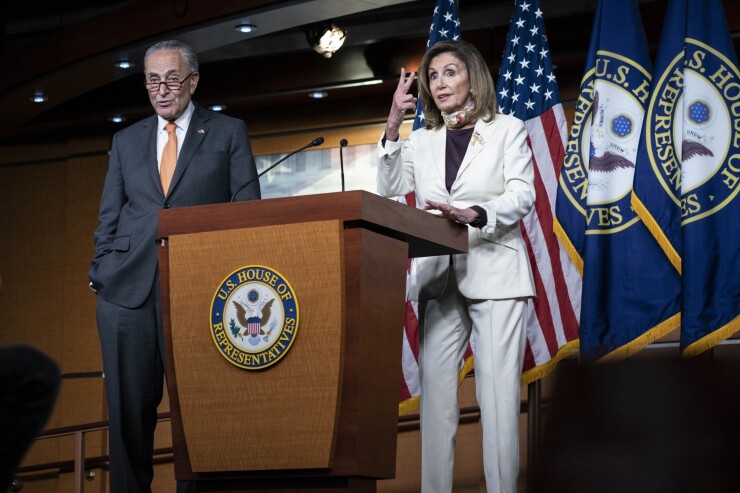
Local and state governments are facing the prospect of a long wait before any new federal aid is approved to help them meet budget shortfalls and increased expenses related to the COVID-19 pandemic.
The Trump administration represented by Treasury Secretary Steve Mnuchin and White House Chief of Staff Mark Meadows on Thursday night rejected an offer by congressional Democrats for both sides to meet halfway on the top line cost of an emergency spending package at $2 trillion.
House Speaker Nancy Pelosi said Friday that Democrats would be about to trim $1 trillion from the around $3.4 trillion HEROES Act that passed the House by changes involving “mostly about how long initiatives last.”
But Republicans refused to come up from their limit of $1 trillion, Pelosi said.
Senate Democratic Minority Leader Chuck Schumer said House and Senate Democrats won’t support a bill that’s less than $2 trillion. And congressional Republicans need widespread support from Democrats in order to pass a compromise bill because there will be widespread opposition on the GOP side, including around 20 Republican senators who have said they will vote against any bill, according to Schumer.
The gap between the two sides includes state and local aid, with the administration offering to agree to $200 billion while the HEROES Act favored by Democrats would provide $915 billion.
R Street, a non-profit public policy research organization that supports free markets, is suggesting that the two sides bridge that division by reinstating tax-exempt advance refunding as a way to allow state and local governments to refinance their debt at a lower cost.
“They could make it easier for local governments to borrow without any bailouts,” R Street said in a press statement.
R Street supports the Investing in Our Communities Act proposed in the House by Reps. Dutch Ruppersberger, D-Md., and Steve Stivers, R-Ohio.
In the Senate, Sen. Roger Wicker, R-Miss., also has proposed advance refunding as part of a coronavirus emergency spending bill along with reinstatement of direct-pay Build America Bonds.
The Securities Industry and Financial Markets Association issued a statement Friday in support of Wicker’s approach.
“It is critical to close the infrastructure financing gap, which has been exacerbated by significant financial pressures stemming from COVID-19 at both the state and local government level, said Kenneth Bentsen, SIFMA president and CEO. “SIFMA believes the reinstatement of advance refunding and direct pay bond programs are critical tools for state and local governments financing their infrastructure.”
One reason for that divide over state and local aid involves a question of whether state and local governments have unspent federal aid that was approved in the CARES Act.
The U.S. Treasury Department recently released a report from the department’s Office of Inspector General on the status of the $150 billion Coronavirus Relief Fund that was included in the CARES Act.
The Treasury report indicated much of that money had not yet been spent as of June 30.
Florida had spent only 11.6% of its $8.3 billion. Arizona had spent only 19.7% of its $2.8 billion. California had spent 74.5% of its $15.3 billion. Illinois had spent only 15.3% of the state’s $4.9 billion.
New York State, where the pandemic hit early, had spent only 54.4% of its $7.5 billion, although hard-hit Nassau County had spent 100% of its $102.9 million share of that money and New York City had spent 99.4% of its $1.45 billion portion of the state allocation.
However, seven state and local government groups issued a joint statement on Aug. 3 emphasizing that the Treasury report provides an incomplete snapshot.
“We note that the CRF funds were not distributed until late April and that the next two months were spent in the development of ‘evolving’ Treasury guidance and FAQs that were not completed until the end of June,” the groups said.
The joint statement by the National Governors Association, the National League of Cities, U.S. Conference of Mayors, National Association of Counties and others said that “state and local governments have moved expeditiously and responsibly in the use of funds and their timely deployment.”
Their statement also pointed out, “Treasury incompletely and, at times inaccurately, reported on only expenditures from the CRF,” which in some cases need approval from state legislatures in order to be committed.
National League of Cities CEO and Executive Director Clarence E. Anthony issued a statement Friday stressing that additional federal aid state and local aid will serve as “unemployment prevention.”
“Small cities and towns across America were left behind through the CARES Act, and our communities simply cannot afford to be left behind by Congress again,” Anthony said. “Local governments have hemorrhaged jobs, with a third of cities already beginning to furlough or lay off essential municipal workers while nearly half are planning to institute hiring freezes.”





